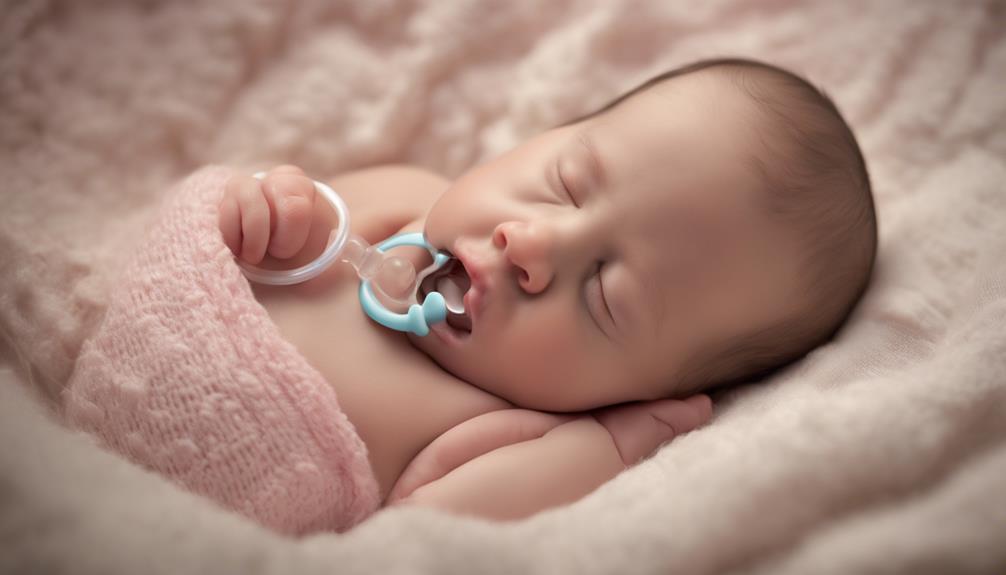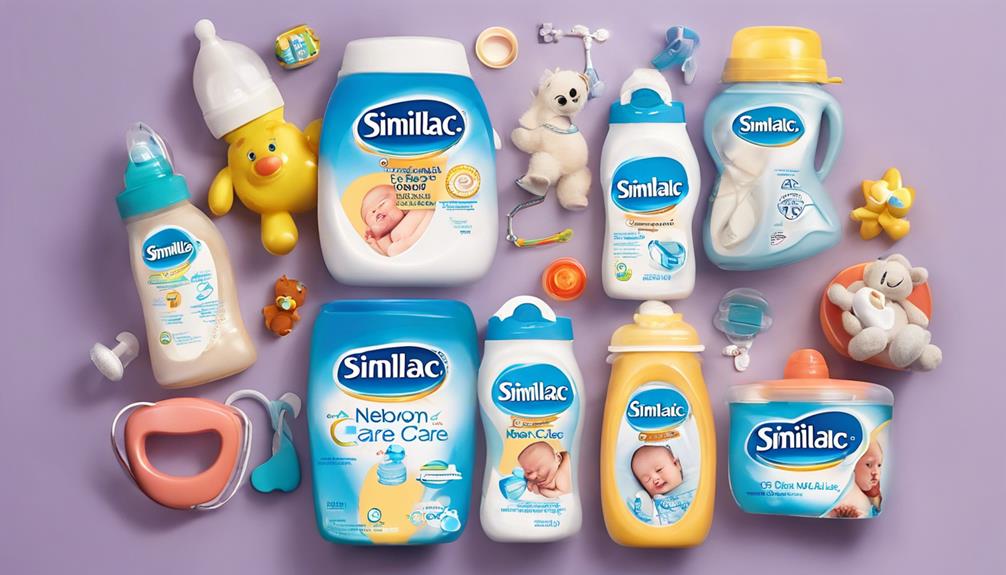When your newborn hiccups persist, like raindrops tapping on a windowpane, you might wonder about gentle ways to ease their discomfort.
Imagine a soothing approach that doesn't involve medications or complicated procedures.
What if simple techniques could bring relief to your little one naturally?
Let's explore some gentle methods that could help alleviate newborn hiccups, providing comfort and peace of mind for both you and your baby.
Key Takeaways
- Newborn hiccups are a natural process after feeding.
- Trust in the process and allow hiccups to pass on their own.
- Burping techniques help release excess gas and prevent hiccups.
- Relaxation methods like skin-to-skin contact and soothing music ease hiccups.
Understanding Newborn Hiccups
If you've ever wondered why your newborn gets hiccups so frequently, it's crucial due to the natural process of diaphragm contractions and air passing through their closed vocal cords. These harmless baby hiccups are common after feeding and typically resolve on their own within a few minutes. It's important to remember that these hiccups usually don't bother your little one and are a normal part of their development.
To help your baby through these hiccups, there are gentle methods you can try. Sometimes, simply burping your baby can relieve the hiccups. Offering a pacifier may also help by encouraging your baby to swallow and helping their diaphragm to relax. Additionally, using calming techniques like gentle rocking or singing softly can provide comfort during these episodes.
Understanding that newborn hiccups are a natural occurrence can bring you reassurance as a parent. However, if the hiccups persist or are accompanied by other concerning symptoms, it's always wise to consult your healthcare provider for guidance.
Waiting It Out

Waiting out newborn hiccups is a common and effective approach as they typically resolve on their own within 5 to 10 minutes. It's completely natural for babies to experience hiccups frequently, and these little episodes usually don't bother them much. Your baby's diaphragm, the muscle responsible for breathing, might just be adjusting to this big new world. Remember, hiccups are harmless and often vanish as quickly as they appeared. So, when you notice those cute little jerks, take a deep breath, relax, and let time work its magic.
It's important to know that newborn hiccups don't usually need any special remedies or interventions. Just continue with your feeding or cuddling routine, and those hiccups will likely be gone before you know it. So, resist the urge to jump in and try to make them stop. Your baby's body knows what to do, and in most cases, the hiccups will pass on their own. Trust in the process, give them a moment, and enjoy these sweet, fleeting moments with your little one.
Burping Techniques

When addressing newborn hiccups, understanding effective burping techniques is key to aiding in the natural relief of discomfort and fussiness associated with these common occurrences.
Burping your baby helps release excess gas in the stomach, which can be a leading cause of newborn hiccups. If you're bottle feeding, remember to burp your little one after every 2-3 ounces to prevent hiccups from surfacing.
The same applies to breastfeeding; make sure to burp your baby between switching breasts to reduce the likelihood of hiccups. Proper burping techniques not only assist in minimizing discomfort but also contribute to a calmer feeding experience, which can naturally relieve hiccups.
Relaxation Methods

To naturally alleviate newborn hiccups, consider incorporating relaxation methods that promote a calm and soothing environment for your little one. Skin-to-skin contact can help relax the baby, while gentle belly rubs provide comfort and alleviate hiccups. Creating a peaceful atmosphere with soft white noise or gentle music can distract the baby and ease hiccups. Make sure your baby is in a comfortable position to promote relaxation and reduce hiccups effectively.
| Relaxation Methods | Description |
|---|---|
| Skin-to-skin contact | Promotes relaxation and bonding between you and your baby, helping to reduce hiccups. |
| Belly rubs | Gentle belly rubs can provide comfort and relief from hiccups, soothing your little one. |
| Calm environment | Creating a quiet and serene space can help soothe your baby, making it easier to relax. |
Pacifiers for Soothing

If your newborn is experiencing hiccups, consider introducing pacifiers as a soothing aid to help calm and relax their diaphragm effectively. Here's why pacifiers are a great natural solution for soothing your baby's hiccups:
- Soothe and Relax: Pacifiers can help soothe and relax the diaphragm, potentially stopping newborn hiccups.
- Calming Sucking Action: The sucking action on a pacifier can aid in calming the baby and alleviating hiccups effectively.
- Pediatrician Recommended: Using a pacifier is a safe and gentle method to help reduce the frequency and duration of newborn hiccups, as pediatricians commonly recommend them.
- Natural Comfort: Pacifiers are a natural way to comfort and pacify babies experiencing hiccups, providing relief in a gentle manner.
Frequently Asked Questions
How Can I Get My Newborn to Stop Hiccups Naturally?
To stop your newborn's hiccups naturally, try burping after feeds, offer a pacifier for relaxation, and let hiccups fade on their own in 5-10 minutes. Create a peaceful feeding space, and avoid gripe water without professional advice.
Is It OK to Lay Baby Down With Hiccups?
It's safe to lay your baby down with hiccups. Hiccups are usually harmless and resolve on their own. Remember to monitor their comfort and well-being. If needed, gently hold them upright for relief.
What to Do if Hiccups Are Not Stopping in Newborn?
If hiccups are not stopping in your newborn, try gently rubbing their back or changing their position to ease the diaphragm. Keep the environment calm and cozy. If hiccups persist, consult a healthcare provider for guidance.
What Is the Best Position to Stop Hiccups in Newborns?
To stop hiccups in newborns, the best position is holding them upright against your shoulder or in a slightly reclined position. This helps release trapped air and reduces pressure on the diaphragm, aiding in hiccups' natural resolution.
Conclusion
As you gently soothe your newborn's hiccups with care and patience, remember that these little hiccups are just a natural part of their development. With each passing moment, your baby is growing and learning in your loving embrace.
So, take a deep breath, cherish these precious moments, and know that you're doing a wonderful job as a parent.
Embrace the journey ahead, filled with moments of joy, love, and endless possibilities.









